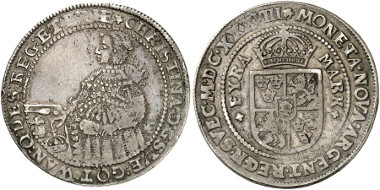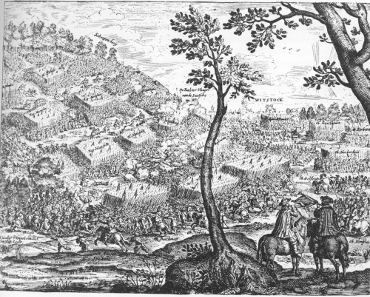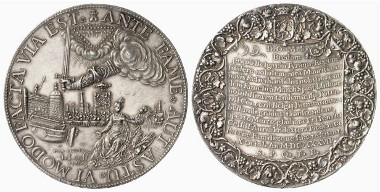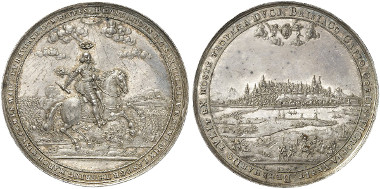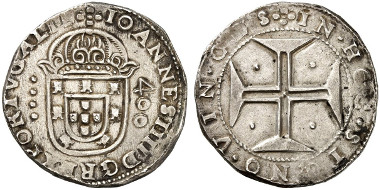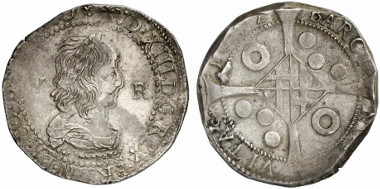translated by Annika Backe
Emperor Ferdinand was lucky enough to die at the height of his power. He did not have to witness the tide turning yet again only a few months later, in favor of his enemies.
Sweden. Christina. 4 mark piece, 1638, Stockholm. Auction sale Künker 246 (2014), 3051.
Axel Oxenstierna had returned to Sweden and had freed little Queen Christina from her mother’s oppressive tutelage. She would reciprocate with continuous loyalty towards her chancellor for almost her entire life. The first result of the increasing influence of Oxenstierna on the government in Stockholm was that the soldiers received their pay more regularly.
Battle of Wittstock 1636, 17th century. Source: Wikicommons.
Among others, the troops of Johan Banér benefited from that. They obtained a decisive victory over the imperial army near Wittstock in Brandenburg on October 4, 1636. This victory restored the reputation of the Swedes. They controlled entire Brandenburg until May 1637, and scared no less a person than John George of Saxony. At the end of the year, Banér would even defeat the army of the elector at Chemnitz and occupy Pirna, before advancing to Bohemia.
Netherlands. Breda. Silver medal, 1637 (by J. van Loof). On the capture of Breda. Auction sale Künker 116 (2006), 4218.
There was a similar twist in the Netherlands as well. After more than a six-month siege, Breda surrendered to Prince Frederick Henry of Orange on October 10, 1637. This city had been in Spanish possession for 12 years, and losing it was the first real setback for the cardinal-infante.
Breisach. Silver medal, 1639 (by S. Dadler). On the capture of the besieged city by Duke Bernhard of Saxe-Weimar on December 3, 1638. Auction sale Künker 242 (2013), 3463.
Inspired by the victories of his allies, Bernhard of Saxe-Weimar felt compelled to mount an offensive at the Rhine. After defeating the imperial soldiers at Rheinfelden near Basel, he and his army marched towards Breisach and began besieging the city in the middle of August 1638. Several attempts to relieve the city failed. On December 17, 1638, the Breisach fortress had to surrender.
Apparently, the huge success went to Bernhard’s head. In spring 1639, the general informed Richelieu about his demand: he wanted to have Alsace conveyed to him. He would keep Breisach since the city had not surrendered to the king of France but to his person alone.
Additionally, he wanted to be treated as an ally on an equal footing in the future, just like Sweden. Fortunately for Richelieu, the problem resolved itself. In the middle of July 1639, Bernhard of Saxe-Weimar fell ill and died within a few days. He bequeathed Breisach to his brother, if desired. If not, the king of France could have it. He left the army to his second-in-command, a Swiss called Erlacher. On October 9, 1639, Erlacher concluded a treaty with Louis XIII in which he acknowledged him as his supreme commander.
In Spain, the cardinal-infante was blamed for the loss of Breisach. It was a convenient cover-up for Spain’s own weakness. In 1640, Spain was forced to stop supporting the governor in any way. Despite the lack of soldiers and financial means the governor tried to secure what had been achieved, at least in a makeshift manner. However, on November 9, 1641, he died, exhausted by the exertions he had endured on behalf of the Spanish king.
Portugal. John IV. 400 reis n. d., Lisbon. Auction sale Künker 254 (2014), 2451.
While this was a practical collapse of the Spanish front in the Netherlands, Cardinal Richelieu brought the war against the Habsburgs to Spain. In 1640, riots had erupted in Catalonia and Portugal, to the benefit of France. The people of Portugal shook off the Spanish rule and made Duke John of Braganza, as John IV, their king. He was immediately recognized by France. He negotiated a truce with the United Netherlands and concluded commercial agreements with England and Sweden.
Spain. Under French siege. Louis XIII. 5 reales, 1642, Barcelona. Auction sale Künker 211 (2012), 2475.
Richelieu likewise took advantage of the revolt in Catalonia. He signed a pact with the rebels, promising to send the French fleet to help them, for Louis XIII being elected Count of Barcelona in return.
In the next part you will read how all parties delayed peace efforts and devastated Germany for good – until, finally, somebody really wanted peace.
All parts of the series can be found here.




